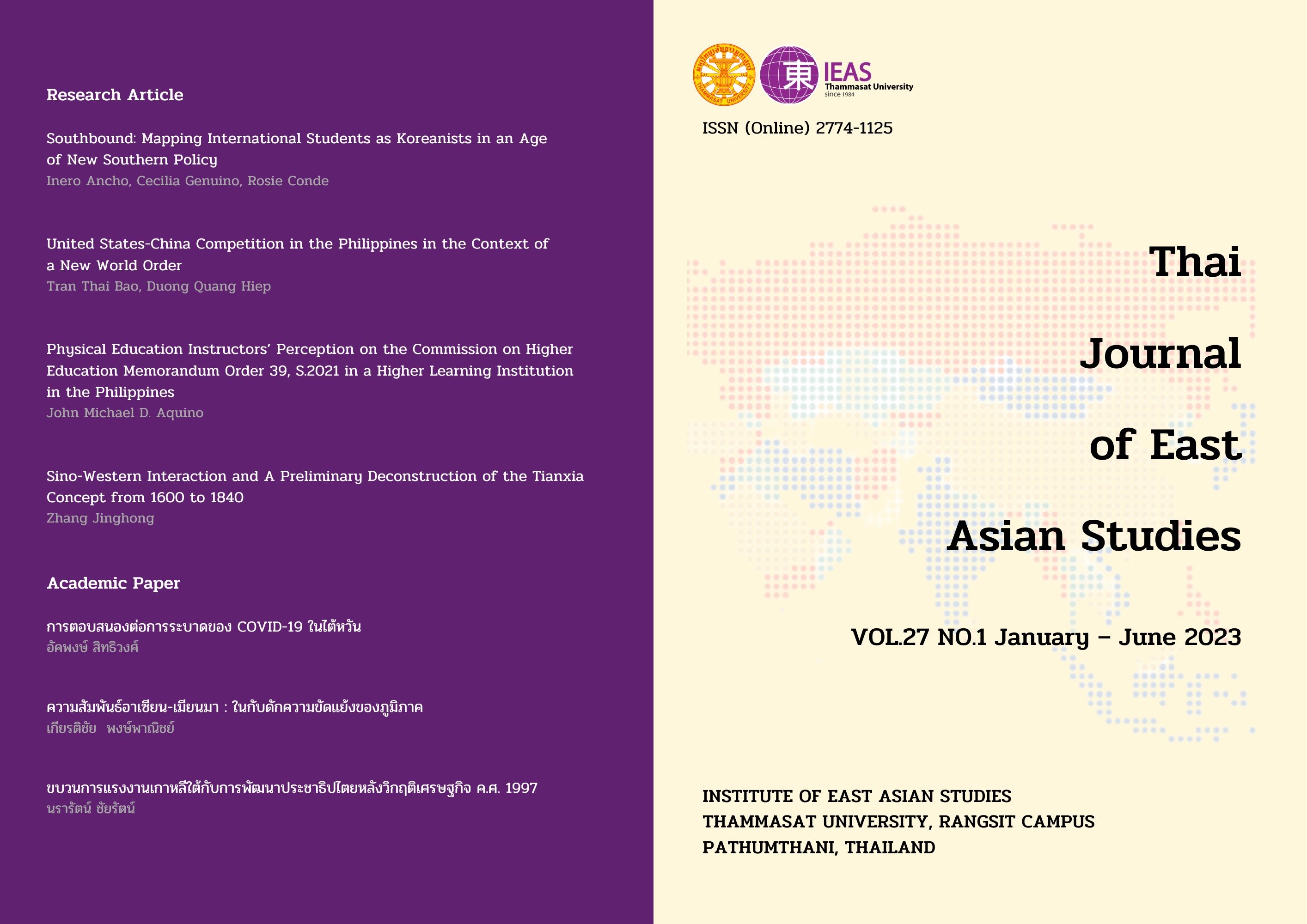The Korean Trade Movements and Democratization after the 1997 Asian Financial Crisis
Keywords:
South Korea, Labor movement, Democratic development, 1997 Asian financial crisis, DemocratizationAbstract
This article studies the role of the South Korean labor movement in developing democracy after the 1997 Asian financial crisis. It examines conditions of internal actors: the labor movement, army, political activists, and capitalists from a historical viewpoint and labor movement dynamics. The role of the labor movement and reaction of internal actors to labor movement dynamics after the 1997 Asian financial crisis are also explored through adherence to democracy by political activists. The goal is to diagnose anti- or pro-democratic sentiments from different attitudes about the labor movement's role after the 1997 Asian financial crisis. The labor movement participated in Korean democratic development after the crisis due to new-found labor movement institutionalization and independence by
non-democratic actors while elites and capitalists accepted negotiations with the labor movement in addition to military reforms by a civilian government’s democratic regime. This additional factor was conducive to democratic development.
Downloads
References
นิฐิณี ทองแท้. (2557). เสรีภาพในการชุมนุมของสาธารณรัฐเกาหลี (เกาหลีใต้). วารสารนิติสังคมศาสตร์, 7(2), 85-127.
รุ่งนภา พิมมะศรี. (2564). ‘ต้มยำกุ้ง’ กับ ‘IMF’ วิกฤติร่วมยุคสมัย ที่พรากความฝันหนุ่มสาวไทยและเกาหลี ไม่ต่างกัน. Thairath. https://plus.thairath.co.th/topic/money/101333
วิเชียร อินทะสี. (2556ก). พลวัตความเป็นประชาธิปไตยในเกาหลีใต้ จากอำนาจนิยมสู่ประชาธิปไตยที่มั่นคง. สำนักพิมพ์แห่งจุฬาลงกรณ์มหาวิทยาลัย.
วิเชียร อินทะสี. (2556ข). พลวัตความเป็นประชาธิปไตยในเกาหลีใต้: สองทศวรรษภายหลังการชุมนุมใหญ่ใน ค.ศ. 1987 [รายงานผลการวิจัย]. สถาบันเอเชียตะวันออกศึกษา มหาวิทยาลัยธรรมศาสตร์.
Alexis de Tocqueville. (1979). ประชาธิปไตยในอเมริกา 1 (วิภาวรรณ ตุวยานนท์, ผู้แปล.). โรงพิมพ์เรือนแก้วการพิมพ์.
Asian Development Bank. (1999). Asian Development Outlook 1999: Economic Openness - Growth and Recovery in Asia. https://www.adb.org/publications/asian-development-outlook-1999-economic-openness-growth-and-recovery-asia
Bae, K., & Cho, S. (2004). Labor Movement in Korea. In Lee, W., & Hanguk Nodong Yonguwon. Labor in Korea 1987~2002. Korea Labor Institute.
Chang, D., & Chae, J. (2004). The transformation of Korean labour relations since 1997. Journal of Contemporary Asia, 34(4), 427-448. https://doi.org/10.1080/00472330480000201
Dahl, R. A. (2000). On Democracy. Yale University Press.
Dahl, R. A. (1971). Polyarchy: Participation and Opposition. Oxford University Press.
Diamond, L. (1992). Economic Development and Democracy Reconsidered. American Behavioral Scientist, 35(4-5), 485. https://doi.org/10.1177/000276429203500407
Diamond, L. (1994). Rethinking civil society: Toward democratic consolidation. Journal of Democracy, 5(3), 4-17. https://doi.org/10.1353/jod.1994.0041
Economist Intelligence Unit. (2020). Democracy Index. EIU. http://country.eiu.com/article.aspx?articleid=859097469
Huntington, S. P. (1984). Will more countries become Democratic?. Political Science Quarterly, 99(2), 202-203.
Kim S. (2003). Civil society in Democratizing Korea. In S, Kim. (Ed.). Korea’s Democratization (pp. 88-89). Cambridge University Press.
Kim S., & Jeong, J. (2017). Historical Development of Civil Society in Korea since 1987. Journal of International and Area Studies. 24(2). 1-14. https://www.jstor.org/stable/44510067
Koo, H. (2006). Engendering civil society: The role of the labor movement. Routledge.
Lee, Y. (2011). Militants or Partisans: Labor Unions and Democratic Politics in Korea and Taiwan. Stanford University Press.
Lipset, S. M. (2003). Political Man: The social bases of politics. In R. Dahl, I. Shapiro and J. A. Cheibub (Eds.). The Democracy Sourcebook (p. 56). The MIT Press.
Tilly, C. (2007.). Democracy. Cambridge University Press.
Downloads
Published
How to Cite
Issue
Section
License
Copyright (c) 2023 Thai Journal of East Asian Studies

This work is licensed under a Creative Commons Attribution-NonCommercial-NoDerivatives 4.0 International License.



